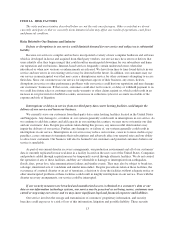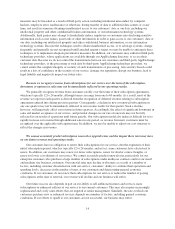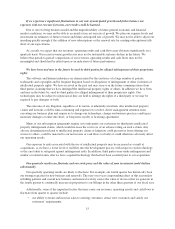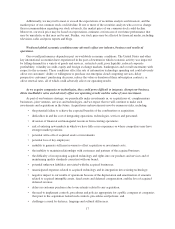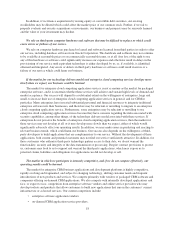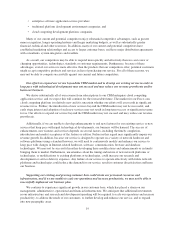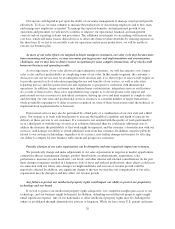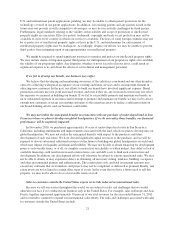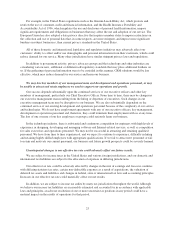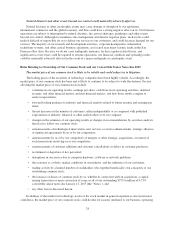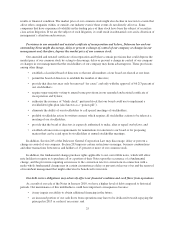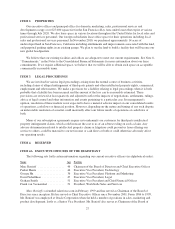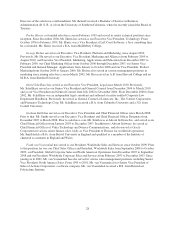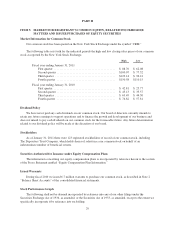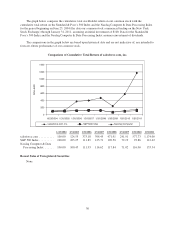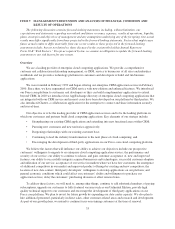Salesforce.com 2011 Annual Report Download - page 31
Download and view the complete annual report
Please find page 31 of the 2011 Salesforce.com annual report below. You can navigate through the pages in the report by either clicking on the pages listed below, or by using the keyword search tool below to find specific information within the annual report.For example, in the United States regulations such as the Gramm-Leach-Bliley Act, which protects and
restricts the use of consumer credit and financial information, and the Health Insurance Portability and
Accountability Act of 1996, which regulates the use and disclosure of personal health information, impose
significant requirements and obligations on businesses that may affect the use and adoption of our service. The
European Union has also adopted a data privacy directive that requires member states to impose restrictions on
the collection and use of personal data that, in some respects, are more stringent, and impose more significant
burdens on subject businesses, than current privacy standards in the United States.
All of these domestic and international legislative and regulatory initiatives may adversely affect our
customers’ ability to collect and/or use demographic and personal information from their customers, which could
reduce demand for our service. Many other jurisdictions have similar stringent privacy laws and regulations.
In addition to government activity, privacy advocacy groups and the technology and other industries are
considering various new, additional or different self-regulatory standards that may place additional burdens on
us. If the gathering of personal information were to be curtailed in this manner, CRM solutions would be less
effective, which may reduce demand for our service and harm our business.
We may lose key members of our management team and development and operations personnel, or may
be unable to attract and retain employees we need to support our operations and growth.
Our success depends substantially upon the continued services of our executive officers and other key
members of management, particularly our Chief Executive Officer. From time to time, there may be changes in
our executive management team resulting from the hiring or departure of executives. Such changes in our
executive management team may be disruptive to our business. We are also substantially dependent on the
continued service of our existing development and operations personnel because of the complexity of our service
and technologies. We do not have employment agreements with any of our executive officers, key management,
development or operations personnel and, therefore, they could terminate their employment with us at any time.
The loss of one or more of our key employees or groups could seriously harm our business.
In the technology industry, there is substantial and continuous competition for engineers with high levels of
experience in designing, developing and managing software and Internet-related services, as well as competition
for sales executives and operations personnel. We may not be successful in attracting and retaining qualified
personnel. We have from time to time experienced, and we expect to continue to experience, difficulty in hiring
and retaining highly skilled employees with appropriate qualifications. If we fail to attract new personnel or fail
to retain and motivate our current personnel, our business and future growth prospects could be severely harmed.
Unanticipated changes in our effective tax rate could adversely affect our future results.
We are subject to income taxes in the United States and various foreign jurisdictions, and our domestic and
international tax liabilities are subject to the allocation of expenses in differing jurisdictions.
Our effective tax rate could be adversely affected by changes in the mix of earnings and losses in countries
with differing statutory tax rates, certain non-deductible expenses as a result of acquisitions, the valuation of
deferred tax assets and liabilities and changes in federal, state or international tax laws and accounting principles.
Increases in our effective tax rate could materially affect our net results.
In addition, we are subject to income tax audits by many tax jurisdictions throughout the world. Although
we believe our income tax liabilities are reasonably estimated and accounted for in accordance with applicable
laws and principles, an adverse resolution of one or more uncertain tax positions in any period could have a
material impact on the results of operations for that period.
23


